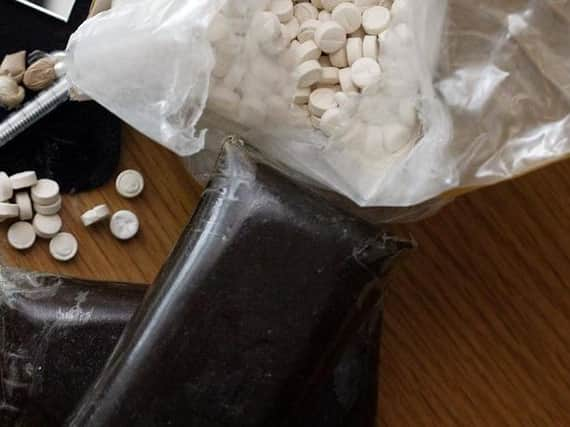Rise in the amount of drugs taken from Wigan’s inmates


Ministry of Justice figures show that 212 searches uncovered illegal substances at HMP Hindley in the year to March 2020 – significantly up from 117 the previous year.
Over the same period, 28 per cent of the mandatory drug tests conducted in the prison returned a positive result, while in 2018-19, the figure stood at 33.
Advertisement
Hide AdAdvertisement
Hide AdThe figures include psychoactive substances, the abuse of which have increasingly become a concern for prison staff nationally, as well as so-called traditional drugs such as cannabis and methadone.
The most common single drug type found to have been taken in Hindley prison was cannabis, which was found in 55 per cent of samples.
The figures were released as drug finds in jails across England and Wales hit a record high – but prison reform charity the Howard League has warned confiscations do not show “the true scale of the problem”.
Nationally a new high of 21,575 searches by prison staff revealed drugs in the year to March, with prisoners failing 14 per cent of random drug tests.
Advertisement
Hide AdAdvertisement
Hide AdFrances Crook, chief executive of the Howard League for Penal Reform, said drugs are a “scourge” in prisons.
She added: “Ministers have spent millions on tightening security, and this may be having an effect, but the best way to reduce the supply of drugs into prisons is to reduce the demand for them.
“Staff time spent monitoring scanners would be better deployed in building relationships and working with people in prison to keep them occupied with work, education, training and exercise.”
Ms Crook said this is one of the reasons why current Covid-19 restrictions in prisons should be eased “safely and as soon as possible”.
Advertisement
Hide AdAdvertisement
Hide AdDuring the pandemic, prisoners have been unable to take part in recreational activities such as using gyms and libraries or going to worship.
Last year, Her Majesty’s Prison and Probation Service set out plans to crack down on the misuse of drugs in prison, with a focus on restricting supply, reducing demand and building recovery services.
As part of the strategy, HMPPS pledged to reduce the proportion of random mandatory drugs tests that are found to be positive by March this year.
Separate figures reveal that Hindley prison did not meet its 17 per cent target for traditional drugs tests in the year to March 2020.
Advertisement
Hide AdAdvertisement
Hide AdThe 13 per cent target for psychoactive substances was also missed, although the data for this only covers a four-month period.
A Ministry of Justice spokesman said: “We are finding and stopping more drugs thanks to the tough new measures brought in by this Government, such as airport-style security and X-ray body scanners.”
He added that it would be “misleading” to draw conclusions on the impact of restricted prison regimes during lockdown.ingly become a concern for prison staff nationally, as well as so-called traditional drugs such as cannabis and methadone.
The most common single drug type found to have been taken in Hindley prison was cannabis, which was found in 55 per cent of samples.
Advertisement
Hide AdAdvertisement
Hide AdThe figures were released as drug finds in jails across England and Wales hit a record high – but prison reform charity the Howard League has warned confiscations do not show “the true scale of the problem”.
Nationally a new high of 21,575 searches by prison staff revealed drugs in the year to March, with prisoners failing 14 per cent of random drug tests.
Frances Crook, chief executive of the Howard League for Penal Reform, said drugs are a “scourge” in prisons.
She added: “Ministers have spent millions on tightening security, and this may be having an effect, but the best way to reduce the supply of drugs into prisons is to reduce the demand for them.
Advertisement
Hide AdAdvertisement
Hide Ad“Staff time spent monitoring scanners would be better deployed in building relationships and working with people in prison to keep them occupied with work, education, training and exercise.”
Ms Crook said this is one of the reasons why current Covid-19 restrictions in prisons should be eased “safely and as soon as possible”.
During the pandemic, prisoners have been unable to take part in recreational activities such as using gyms and libraries or going to worship.
Last year, Her Majesty’s Prison and Probation Service set out plans to crack down on the misuse of drugs in prison, with a focus on restricting supply, reducing demand and building recovery services.
Advertisement
Hide AdAdvertisement
Hide AdAs part of the strategy, HMPPS pledged to reduce the proportion of random mandatory drugs tests that are found to be positive by March this year.
Separate figures reveal that Hindley prison did not meet its 17 per cent target for traditional drugs tests in the year to March 2020.
The 13 per cent target for psychoactive substances was also missed, although the data for this only covers a four-month period.
A Ministry of Justice spokesman said: “We are finding and stopping more drugs thanks to the tough new measures brought in by this Government, such as airport-style security and X-ray body scanners.”
He added that it would be “misleading” to draw conclusions on the impact of restricted prison regimes during lockdown.